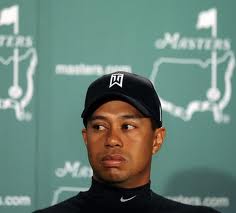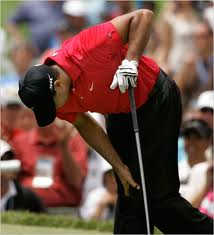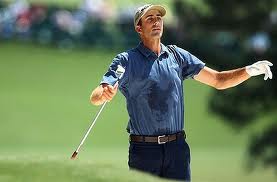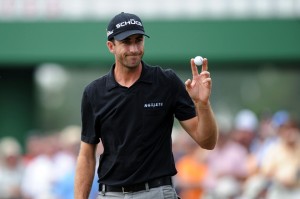I'm not sure when all is said and done that the biggest difference between the America of today and the America of generations past isn't our current obsession with winning. That, of course, and the now commonly held belief in this country that anything short of winning is  losing.
losing.
That mindset, as well as our joyless pursuit of trophies, medals, ribbons, podiums and prize money, regardless of the cost, has turned America into the land of the humorless competitor; a nation of Type-A sporting zealots who often seem incapable of even trace amounts of graciousness in the face of defeat.
And, lo and behold, who has emerged as the crowned price of humorless intensity? The guy who, literally, sets the standard for churlish behavior, on and off the field of play? None other than that former boy wonder, the poster child of steely-eyed resolve, Tiger Woods.
Look, the man's intensity is legendary, as is his desire to finish first, week after week. But he so wears his feverish need to win on his sleeve that now, more often than not, it comes off as an unhealthy and rather unseemly obsession.
And when Tiger's not winning, it crosses over into something far more damning to a man's good name: juvenile, even child-like, behavior.
 You want to know why most Americans now rate the world's richest and most famous athlete just a tick or two above politicians and used car salesmen on the scale of likeability? Or why (marital woes notwithstanding) he's lost so many sponsors of late?
You want to know why most Americans now rate the world's richest and most famous athlete just a tick or two above politicians and used car salesmen on the scale of likeability? Or why (marital woes notwithstanding) he's lost so many sponsors of late?
Watch his interview with CBS's Bill Macatee as he walked off the 18th green after the final round of the 2011 Masters.
Tiger comes off like a jerk. Or what we proud Chicagoans might call, a jagoff.
But not just any jagoff. As I watched him, I realized Tiger Woods had truly become a world-class jagoff. A jagoff of almost epic proportions.
In fact, as big and as great a jagoff as he once was a golfer.
Yeah, I know Tiger Woods is intense. And yeah, I know he travels to Augusta every year trying like hell to win one of those green jackets. But when you're a PGA tour player, who doesn't?
Seriously. At that level, which of those guys doesn't?
So when Tiger pulled his "I'm intense and you'll never understand the depth of my intensity" thing on Macatee, the only thing I could think of was something that always comes to mind when I see someone driving around with one of those "Warning, I brake for animals!" bumper stickers.
What are you, special?
Like the rest of us actually hit the gas when we see little critters in the road up ahead?
 If you can find it online somewhere, take a moment to watch the interview that Macatee did with Australian Geoff Ogilvy, the former U.S. Open champion, just moments after he spoke to Tiger Woods.
If you can find it online somewhere, take a moment to watch the interview that Macatee did with Australian Geoff Ogilvy, the former U.S. Open champion, just moments after he spoke to Tiger Woods.
Ogilvy was clearly disappointed throughout the interview, but he was gracious to the CBS reporter, to the point of accommodating. As were two other Aussies Macatee interviewed, Adam Scott and Jason Day.
Gracious as well was Britain's Luke Donald, whose game is so strong right now, he might never again have a better chance to win a green jacket than he had this past weekend.
And that's not to mention yet another guy from foreign soil, Northern Ireland's Rory McIlroy, the third-round leader who melted down and limped home with an historically putrid final-round score of 80. Even as a 21-year old kid fresh off the most publicly humiliating four hours of his life, McIlroy showed dignity, maturity and grace for as long as Macatee kept pumping him with questions.
Tiger, meanwhile, took what could have been one of the great moments of his comeback story -- rallying back from 7 down on the final day of the Masters to, if only for a moment, take the lead -- and pissed it away by being a jerk.
And Ogilvy? You know what happened to him that day, just moments before Macatee stuck a microphone in his face and interviewed him as he walked off 18?
He too had come from 7 down on the final day at Augusta to actually lead the Masters -- only to let it slip away.
Just like Tiger.
 The difference was, unlike the game's newest villain (not to mention its orneriest, most condescending and tightly wound narcissist), Ogilvy swallowed his bitter disappointment, put on a genial face, and at least for the 90 seconds it took for him to answer three simple questions, graciously allowed a fellow professional do his job.
The difference was, unlike the game's newest villain (not to mention its orneriest, most condescending and tightly wound narcissist), Ogilvy swallowed his bitter disappointment, put on a genial face, and at least for the 90 seconds it took for him to answer three simple questions, graciously allowed a fellow professional do his job.
